John Dewey is often seen as the proponent of learning by doing – rather than learning by passively receiving. He believed that each child was active, inquisitive and wanted to explore. How to capitalise on these drives?
Dewey set up the Laboratory School that was allied to the University of Chicago. Children there were encouraged to learn through experience, clarify the key points and apply the lessons to get practical results.
Philosophy and Background
Dewey referred to his philosophy as instrumentalism, rather than pragmatism, though the two are related. Instrumentalism sees the value of an idea or tool being its use as an instrument for getting results. Bearing this in mind, learning should be relevant and rewarding – rather than only theoretical.
Education should also equip students to take a full and active part in shaping their future society. Traditional education, he believed, saw children as empty, passive receptacles to be filled with ideas. This helped to support the existing order.
Progressive education, for which he – rightly or wrongly – became known, saw school as an opportunity for children to develop as individuals and citizens. They may even be able to find their real vocation. He wrote:
“To find out what one is fitted to do, and to secure an opportunity to do it, is the key to happiness.”
Dewey’s views sparked controversy. Backed by humanists, his writings spread far and wide. He travelled the world, lecturing in places such as Europe, China and Japan.
Some progressive educationalists interpreted his ideas to children complete license. This provided ammunition for traditionalists and drew criticism from the author himself.
John’s views, however, continue to appeal to those who aim to translate philosophy into practice. For example, people who focus on project work, action learning, workshops, simulation and community based learning.
Here is how Mark K. Smith has described John’s contribution. Mark’s piece can be found on Infed, an excellent site that provides information about informal education. You can find the original piece at:
“John Dewey’s significance for informal educators lies in a number of areas.
“First, his belief that education must engage with and enlarge experience has continued to be a significant strand in informal education practice.
“Second, and linked to this, Dewey’s exploration of thinking and reflection – and the associated role of educators – has continued to be an inspiration. We can see it at work, for example, in the models developed by writers such as David Boud and Donald Schön.
“Third, his concern with interaction and environments for learning provide a continuing framework for practice.
“Last, his passion for democracy, for educating so that all may share in a common life, provides a strong rationale for practice in the associational settings in which informal educators work.”
Dewey’s educational views continue to polarize opinions. Some critics see him as a ‘liberal’ whose ideas subverted schools in America.
(Others argue his philosophy was never actually implemented in mainstream education.) John wrote an enormous amount of material on many subjects – such as psychology, philosophy, aesthetics and democracy.
Beginnings
John was born in 1859, in Burlington, Vermont. His father was Archibald Sprague Dewey, whose ancestors had lived in New England for over 200 years.
Archibald grew up on a farm and went on to own the Burlington general store. He also loved literature. Lucina, John’s mother, grew up in a more middle class background. Her father was the local judge and all her brothers became college graduates.
John was the third child in the family and was given the first name of his oldest brother John Archibald, who died in 1859 due to a domestic accident. Lucina had strict religious views and also insisted on her three children – all boys – pursuing their education.
Burlington had a relatively cosmopolitan community and was home to the University of Vermont. Both factors influenced John’s future. He enjoyed learning from the different cultures, whilst also gathering knowledge from his jobs as a newspaper boy and in the local lumberyard.
John was an average student at school. Whilst his father wanted him to become an engineer, it may have been the proximity of the university that enabled John to move into academia. Enrolling at the age of 15, he graduated in 1879 with a major in philosophy from the University of Vermont.
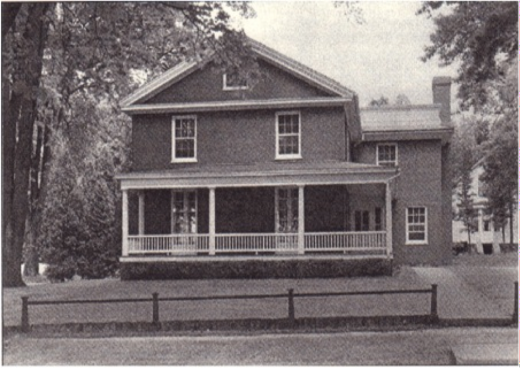
John’s bithplaceat 186 S. Willard Street, Burlington, Vermont.
Academia
John spent the next few years teaching; first at a high school in Pennsylvania, then at the Lake View Seminary in Charlotte, Virginia. Returning to Burlington, he took up another teaching role.
During this time he wrote a paper called The Metaphysical Assumptions of Materialism which was later published in the Journal of Speculative Philosophy.
Enrolling at Johns Hopkins University in 1882, he studied for his doctorate, which he gained in 1884. John spent much of the next 45 years or so in academia, teaching at the University of Michigan, followed by the University of Chicago and finally Columbia University.
John married Alice, his first wife, in 1886. They had six children, with just four surviving into adulthood. The Deweys also adopted a boy, Sabino, who they met in Italy.
Alice became Principal of the Laboratory School at the University of Chicago, but a dispute about the school led to them leaving Chicago.
John went on to Columbia University, where he worked until retiring as a full-time faculty member in 1930. He was then appointed professor emeritus of philosophy in residence at Columbia, however, and held that post until his eightieth birthday.
Alice died in 1927 and he married his second wife, Roberta, in 1946. He continued to write, travel and lecture until his death in 1952. The US Postal Service issued a stamp in his honour on the date of his birthday on October 21 1968.
The Laboratory School
Dewey wrote on many topics – such as philosophy, psychology and aesthetics – but the one we will focus on is education. John began by studying philosophy, but soon became interested in psychology.
He was particularly drawn to the works of William James, elements of which he merged into his developing views on education.
America was shifting towards a different kind of economy and, John maintained, traditional schooling would not produce active, creative citizens. So how could students develop skills to shape their future lives? He believed education must be linked to the child’s experience.
Students were much more likely to embrace mathematics, for example, if they could see how it applied to their daily lives. He wrote in My Pedagogic Creed.
“I believe that the school must represent present life – life as real and vital to the child as that which he carries on in the home, in the neighborhood, or on the playground.”
John was given the opportunity to test his ideas at the Laboratory School at the University of Chicago. Alice, his wife, was the Principal and the curriculum was based around real-life issues.
(It’s worth noting that the school was set-up to experiment with various modes of learning – rather than be a prototype for all schools.)
Peggy Hickman gives an excellent overview of the approach used at the school in an article she wrote about John Dewey. She wrote:
“… The teachers were to present real life problems to the children and then guide the students to solve the problem by providing them with a hands-on activity to learn the solution …
“Cooking and sewing was to be taught at school and be a routine. Reading, writing, and math was to be taught in the daily course of these routines. Building, cooking, and sewing had these schooling components in it and these activities also represented everyday life for the students.
“The students had to measure things and be able to read to do these things. For an example, if a student was not able to read it was here how they would be taught to achieve the ability to read.”
“The child would experience school as being in a community. This would help the child learn how to share and communicate with others. Problems would be presented to the child and by trial and error the child would be able to solve the problem.
“The teacher’s responsibility was to be aware of where each child was intellectually and provide appropriate problems for the child to solve. Dewey wrote a book about his findings from the Dewey school called The School and Society.”
What became known as The Dewey School came about because the University of Chicago offered John the chairmanship of the department of philosophy, psychology and pedagogy. He set up the school as part of his work and it operated for 7 years.
Most children came from the Hyde Park area of Chicago and, at its peak, it had over 100 students. Many were from reasonably well-off families and there were no African American students. Dewey learned a great deal from the school, much of which was translated into his writings.
The experiment was ended, however, when Chicago’s president, William Rainey Harper, failed to consult John before merging the school with the university training school for teachers. The transition proved difficult and eventually led to the Deweys leaving.
Alice found the experience particularly depressing. James Scott Johnston gives an account of the events at the Laboratory School in his book Inquiry and Education: John Dewey and the Quest for Democracy.
The Laboratory School survived, however, and lives to this day. Below is an excerpt from its website. You can discover more via the following link.
http://www.ucls.uchicago.edu/about-lab/index.aspx
Writings
Combining his views on education with observations at The Laboratory School, John produced a succession of books. These included: My Pedagogic Creed, The Child and the Curriculum and The School and Society.
The latter two books were based on his lectures and laid out his educational beliefs. He later expanded on these theories in books such as How We Think and Democracy and Education.
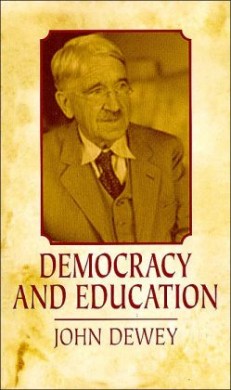
Many years later – in 1938 – he published Experience and Education. Based on a series of lectures, this book revisited and refined his views.
Dewey reiterated the link between real-life experience and education. He remained critical of traditional methods that saw children as passive beings, but also criticised some progressive educationalists.
He believed that some of his views had been misinterpreted, applied in a haphazard manner or not subjected to scientific measurement. On the other hand, some would argue, his writing can sometimes be dry and hard to decipher.
Dewey’s work remains an inspiration to many, however, so let’s explore the principles behind his views on education.
Principles
Great educators make learning real, relevant and rewarding. This tradition became well-established in Europe by thinkers such as Pestalozzi, Froebel and, later, Montessori.
Dewey was one of the first to promote this approach in America, however, and seen as a giant in the field. Here are some – though not all – of the principles that run through his work.
People can learn by participating
in relevant learning experiences
Great educators ask questions such as:
“What does the person want to learn? How can we set clear goals? How can we be clear on their and my responsibilities in reaching the goals?
“How can I make the learning enjoyable and effective? How can I provide them with practical models, ideas and tools? How can I help them to achieve their picture of success? How can I help the person to fulfil their potential?”
Great educators also recognise that people learn in different ways – what today are called multiple intelligences.
Dewey’s approach embraced many of these themes. He believed that students could learn an enormous amount by participating in relevant experiences.
The Education Encyclopedia at Stateuniversity.com gives an excellent overview of John’s philosophy of education. Here is an extract you can find at:
“The starting place in Dewey’s philosophy and educational theory is the world of everyday life … (however) Dewey was careful in his writings to make clear what kinds of experiences were most valuable and useful. Some experiences are merely passive affairs, pleasant or painful but not educative …
“An educative experience, according to Dewey, is an experience in which we make a connection between what we do to things and what happens to them or us in consequence; the value of an experience lies in the perception of relationships or continuities among events …
“It is this natural form of learning from experience, by doing and then reflecting on what happened, which Dewey made central in his approach to schooling.”
People can develop their problem-solving skills, clarify
the learning and apply the lessons in their daily lives
Dewey believed that learning by doing enabled students to develop their problem-solving skills. They could then clarify the learning and apply it in their future lives.
Today this is considered obvious. You expect fire-fighters, lifeboat crews, paramedic teams and all kinds of apprentices to hone their skills in life-like situations. They don’t spend all day sitting in classrooms listening to abstract theories.
Dewey underlined this point by writing:
“Only in education, never in the life of farmer, sailor, merchant, physician, or laboratory experimenter, does knowledge mean primarily a store of information aloof from doing.”
He inspired many educators to explore and develop the concept of experiential learning. Let’s move onto another principle in John’s work.
People can follow their vocation and
develop the habit of life-long learning
A person’s vocation is their calling: it is what they are here to do. They can follow their vocation, express it through various vehicles and do valuable work.
Dewey railed against the concept of vocational training being used to serve industry. Students were being prepared for jobs in which they might be trapped for life.
He had a very different view of what a vocation entailed – and also believed in life-long learning. Dewey wrote in Democracy and Education:
“Put in concrete terms, there is danger that vocational education will be interpreted in theory and practice as trade education: as a means of securing technical efficiency in specialized future pursuits …
“It is a conventional and arbitrary view which assumes that discovery of the work to be chosen for adult life is made once and for all at some particular date.”
“The dominant vocation of all human beings at all times is living – intellectual and moral growth …
“The preparation for vocations (should) be indirect rather than direct; namely, through engaging in those active occupations which are indicated by the needs and interests of the pupil at the time …
“Only in this way can there be on the part of the educator and of the one educated a genuine discovery of personal aptitudes so that the proper choice of a specialized pursuit in later life may be indicated.
“Moreover, the discovery of capacity and aptitude will be a constant process as long as growth continues.”
People can take responsibility, think for
themselves and take an active role as citizens
Dewey declared in My Pedagogic Creed: “I believe that education is the fundamental method of social progress and reform.”
Schools could achieve this in several ways.
They could encourage students to take charge of their learning and make informed decisions.
They could enable students to practise some form of democracy within their own institutions.
They could play a more active part in the wider community.
Dewey wanted students to develop critical thinking which, he believed, would provide a fail-safe against forces that might want to impose a dictatorship.
He also warned against the pressures stopping people pursuing their vocation. He wrote in Democracy and Education:
“In an autocratically managed society, it is often a conscious object to prevent the development of freedom and responsibility; a few do the planning and ordering, the others follow directions and are deliberately confined to narrow and prescribed channels of endeavor.”
“Education would then become an instrument of perpetuating unchanged the existing industrial order of society, instead of operating as a means of its transformation. The desired transformation is not difficult to define in a formal way.
“It signifies a society in which every person shall be occupied in something which makes the lives of others better worth living, and which accordingly makes the ties which bind persons together more perceptible – which breaks down the barriers of distance between them.”
“But it does mean that we may produce in schools a projection in type of the society we should like to realize, and by forming minds in accord with it gradually modify the larger and more recalcitrant features of adult society.”
Dewey believed it was vital for schools to encourage students to think for themselves. They would then be more likely to become active citizens who could help to shape a better society.
Practice
So what have been the effects of John Dewey’s work?
Peter Senge is the author of The Fifth Discipline: The art and practice of the learning organisation. A recognised authority on organisational development, he acknowledges the groundbreaking work done by John Dewey.
I was at a conference where Senge began his keynote by saying:
“The art of developing a learning organisation goes back to Dewey. He provided the framework that can be summarised as: ‘The learner learns what the learner wants to learn.’
“Great organisations encourage people to maintain the learning habit. They focus on learning that enables both the person and the organisation to continue to develop.”
Dewey’s views have had a profound impact on educational systems. They have provided the philosophical basis for learning by doing, project work, simulation and many forms of experiential education.
Dewey continually pointed out, however, that some experiences were more valuable than others. Teachers must be able to intellectually justify the educational activities, rather than simply let people do their own thing.
Many of his ideas have become an accepted part of educational and training events across the world.
He cared about people and the future of humanity. As we mentioned at the beginning, when considering each person’s potential, he wrote:
“To find out what one is fitted to do, and to secure an opportunity to do it, is the key to happiness.”
John dedicated his work to enabling many more people to enjoy this opportunity. He remains one of the most influential educational thinkers.


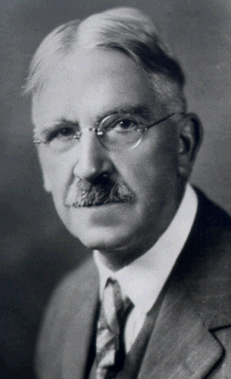
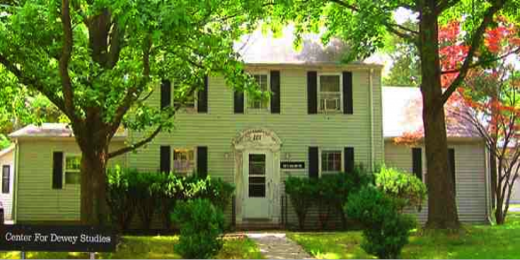
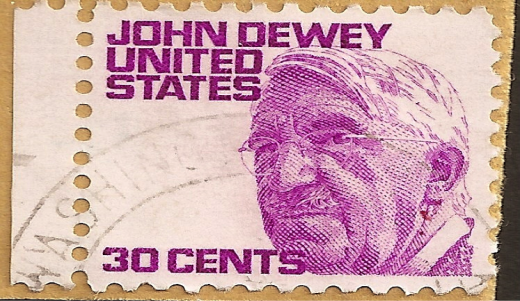
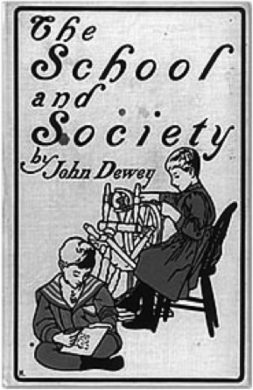




[…] Peg. D is for John Dewey: His approach to education (2017). Retrived from https://www.thepositiveencourager.global/john-deweys-approach-to-doing-positive-work/ […]
[…] how will educators react? Will we ask kids to take a drugs test before each maths test? Or take the Dewey approach and encourage it as a form of experiential […]
i fund it most relevant to current demand of education
[…] a global concern. Student councils were one mechanism that emerged, inspired by the writings of John Dewey. Teaching students good decision making skills and involving them in the running of their school, […]
[…] John Dewey […]
[…] is important to one’s education is definitely not new. Progressive education creator, John Dewey, believed that “education should also equip students to take a full and active part in […]
[…] D is for John Dewey: His Approach To Education […]
[…] D is for John Dewey: His Approach To Education […]
[…] D is for John Dewey: His Approach To Education […]
[…] Peg. D is for John Dewey: His approach to education (2017). Retrieved from https://www.thepositiveencourager.global/john-deweys-approach-to-doing-positive-work/ […]
How can I reference this article? Can you please send me the article information so I may do so?
Thank You.
[…] Some of these tensions have existed in schooling for generations (see critiques here, here, and here), to be sure, but the pervasion – perversion? – of neoliberal values in our schools has changed […]
A very good explanation
[…] modern tech job today is a perfect example of the Dewey and Montessori principles of “Learning by doing” and require high capacities of self-teaching […]
It is anice presentation
[…] John Dewey […]
John Dewey’s idea and belief of ‘learning by doing’ was supported by many.
One of them is Ivan Illich who wrote “Deschooling Society” and other books on the same issue. Illich lived for some time in Cuernavaca, Mexico
( after he moved from New York) and founded the school “Centro Intercultural de Documentación”.This was in the late 1960s. Then he moved to the Uniersity of Hannover, Germany as Professor of History.
Illich was a strong supporter of Dewey.
“The best way of being is by doing.” Mao Zedong
[…] is for Dewey” The Positive Messenger blog, https://www.thepositiveencourager.global/john-deweys-approach-to-doing-positive-work/. […]
A nice presentation. It is relevant to competence based curriculum where both the learner and the teacher play an active role in the classroom.practice and experience is common.
Very good cover for collectivist ideology. American students are now reaping the rewards of experiential incompetence. My college chemistry students have not been prepared in the public school system for the rigors of Physical Science and critical thinking.
[…] https://www.thepositiveencourager.global/john-deweys-approach-to-doing-positive-work/ […]
Thank you, Mike. This greatly helped my paper of Purpose of Education.
Nice read
[…] Bearing this in mind, learning should be relevant and rewarding – rather than only theoretical. https://www.thepositiveencourager.global/john-deweys-approach-to-doing-positive-work/Image credit: Amy Stott […]
Learnt his philosophy about 28 years ago…and I constantly refer back to it to remind me what teaching/ learning should look like in the classroom.
Thanks, its a great inspiration and a model for good teaching
Thank you for sharing the importance and essence of education through this article. With the help of this article, there are many new things that one learns. Education really helps to build a country and make it a strong economy. It also helps the country to make use of its own talent as opposed to finding talent from other counties. Thank you for sharing this interesting article with us.
As a practicing educationist I see the revival of Dewey’s conceptions in modern education, particularly in the medical science and that’s so in Undergraduate curriculum. Experiential and reflective learning have already made in-road in the existing curriculum. Teachers are accepted more as a facilitators on as when necessary basis, not in their usual sentinel role. Problem oriented learning helps students to be prepared for their future clinical encounter with the patient as well as that improvement of communicational mannerism. It is still a long way but Dewey’s philosophy and guideline is the essence of this new venture to infused vitality in the health sciences. I sincerely hope to get the chance to say more about the modest achievement from our side on his next birthday on 21st October. Till then we will keep on a pragmatic outlook on the views of this stand alone personality.